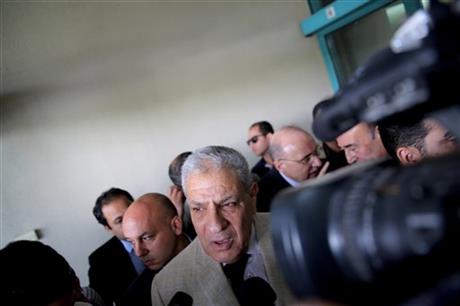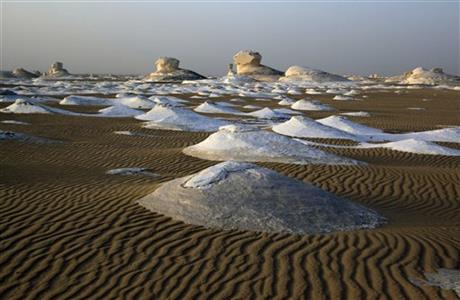
Egyptian forces hunting militants in the country’s western desert mistakenly opened fire on Mexican tourists on safari, killing 12 people and dealing a further blow to the government’s efforts to project an image of stability as it fights an increasingly powerful insurgency, officials said Monday.
Egyptian officials said the group did not have permission to be in the area, but have not offered a full account of Sunday’s incident, in which another 10 people were wounded. Mexico’s President Enrique Pena Nieto condemned the attack and demanded a full investigation, and his foreign minister said survivors told officials they were fired upon by helicopters and other aircraft.
The incident, among the deadliest involving tourists in Egypt, comes as the country is trying to revive its vital tourism industry after the turmoil following the 2011 uprising that toppled President Hosni Mubarak.
Egypt has mainly been battling insurgents in the northern Sinai Peninsula, on the other side of the country, where Islamic militants stepped up attacks on security forces after the military ousted Islamist President Mohammed Morsi in 2013 amid massive protests against his rule.
But in recent months militants loyal to the Islamic State have carried out a series of attacks in more central parts of the country, including the bombing of the Italian Consulate in Cairo and the kidnapping and beheading of a Croatian oil surveyor who was working in the capital.
The Mexican Foreign Ministry confirmed that at least two of the dead were Mexican nationals and said victims were still being identified. Mexican Foreign Secretary Claudia Ruiz Massieu said Mexicans wounded in the attack told their ambassador they were fired upon by helicopters and aircraft.

Mona el-Bakri, the spokeswoman for the Dar al-Fouad hospital where the wounded were being treated, said two of the seven Mexicans receiving treatment also hold American citizenship. A State Department official said an American woman was injured. The official, speaking on condition of anonymity, declined to say more because the woman had not waived her privacy rights.
Egypt’s Interior Ministry said in a statement that a joint military-police force was pursuing “terrorist elements” in the area and fired on four vehicles that turned out to be carrying tourists. The ministry said the victims were Egyptian and Mexican.
Egyptian officials claim the safari convoy had wandered into a restricted area. The tour company involved “did not have permits and did not inform authorities,” Rasha Azazi, a spokeswoman for the Egyptian Ministry of Tourism, told The Associated Press, adding that any trips to that area must be cleared by officials. “They were not supposed to be there,” she said, without providing further information about the incident.
Military spokesman Brig. Gen. Mohammed Samir said he was not authorized to speak on the matter, and Interior Ministry officials have not responded to numerous requests for comment.
Hamada Hashem, a desert guide living in a nearby village who witnessed the strike, said it appeared to have been linked to the kidnapping of a local resident named Saleh Qassim Said by militants two days earlier. Hashem said police and local residents, including himself, mounted a rescue operation, but the heavily armed militants drove them off. The police then asked the military to get involved, he said.
On Sunday the Islamic State group’s Egypt affiliate circulated photos purportedly showing clashes with security forces and what it said was the beheaded body of Said, whom it accused of being a spy for the security services, according to the SITE Intelligence Group, a U.S.-based group that monitors militant websites.
Hashem said local security forces advise against going to the desert areas around his village, but they often turn a blind eye, knowing how important the safaris are to the local economy.
“The army says don’t go there, but they know that we can’t find anything to eat, so when (a tourist) comes, we resist (the military), say ‘no, we will go,’ and go,” Hashem said. “After what I have seen, I will not spend the night in the desert again.”
Gabriela Bejarano said her brother Rafael was killed in the attack. She denied claims the group was not authorized to be in the area.
“That’s not true. I have been there twice, the controls are very strict. You can’t have a tourism agency, or even be a tourist guide, without a government license,” she told reporters in the Mexican city of Guadalajara. She said Rafael had also been to Egypt before.
She said the guide for the trip was Nabil El Tamawi. A profile on the website of Windows of Egypt Tours, which offers safaris in the western desert, says El Tamawi has been leading Spanish and Latin American groups since 1990, and specializes in leading groups interested in meditation.
Rachael Stewart, a business partner of Rafael Bejarano who lives in San Clemente, California, said the tour group of around 15 people was organized by Bejarano’s mother, Marisela, who is recovering from wounds sustained in the attack. Stewart said the trip was planned as a sort of spiritual retreat, and that Marisela organized similar trips about every year-and-a-half.
Rafael Bejarano, 41, had lived in San Clemente for about three years and was a self-described shaman, faith healer, and player of the didgeridoo — a long, wooden horn from Australia.
“He touched everybody with his heart, with his music, with his soul,” Stewart told The Associated Press.
Bejarano’s Facebook page showed photos of him playing the didgeridoo in front of the pyramids at Giza, working as an activist to improve the lives of Mexico’s Huichol people, and visiting an indigenous tribe in the Amazon jungle of Ecuador. He also performed a “shamanic healing concert” in Mission Viejo.
Egypt’s western desert has long been a popular safari destination, with tourists flocking to its verdant oases, unique rock formations and white sand dunes.
In recent years, however, it has been the subject of security concerns because of the long, porous border with Libya. Egypt has been flooded with weapons, mostly from Libya, since the 2011 uprising that toppled longtime Libyan dictator Moammar Gadhafi and plunged that country into turmoil.
Egyptian security forces frequently target smugglers in the western desert, and in July 2014, gunmen armed with rocket-propelled grenades attacked a border guard post, killing 21 troops.
___
Associated Press writers Mark Stevenson in Mexico City and Matthew Lee in Washington contributed to this report.



